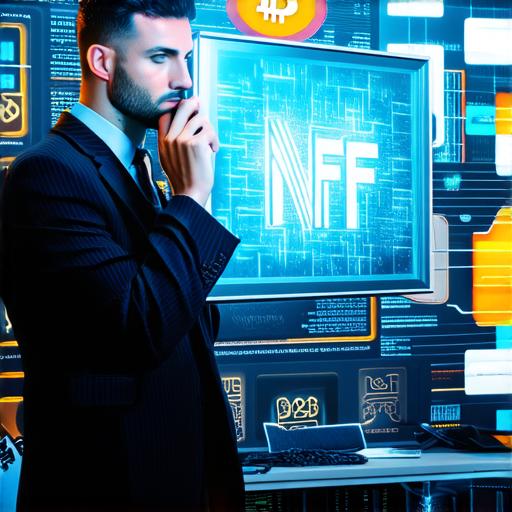
Do NFTs actually hold any genuine value
What Are NFTs?
NFTs are unique digital assets that are stored on blockchain technology. They can represent anything from art and music to collectibles and real estate. Unlike cryptocurrencies, which are interchangeable and fungible, NFTs are one-of-a-kind and cannot be replaced.
The Rise of NFTs
NFTs have experienced a rapid rise in popularity over the past few years. In 2021 alone, the global NFT market was valued at over $30 billion, with sales reaching an all-time high of $2.5 billion in a single day. This growth can be attributed to several factors, including:
- Increased adoption by celebrities and brands: NFTs have gained widespread attention thanks to high-profile endorsements from celebrities like Jack Dorsey, Elon Musk, and Drake. Brands such as Louis Vuitton and Coca-Cola have also started exploring the potential of NFTs.
- Growing demand for unique assets: As the world becomes more digitized, there is a growing demand for unique and authentic digital assets. NFTs provide a way to monetize and verify ownership of these assets.
- Accessibility and affordability: Unlike traditional art and collectibles, which can be expensive and exclusive, NFTs are accessible and affordable to anyone with an internet connection. This has made them popular among both individual investors and institutional investors.
The Benefits of NFTs
NFTs offer several benefits that make them attractive as a form of investment:
- Ownership and authenticity: NFTs provide a way to verify ownership and authenticity of unique assets, making it easier for buyers and sellers to transact with confidence.
- Limited supply: NFTs are limited in supply, which makes them valuable and attractive to investors. Unlike cryptocurrencies, which can be mined indefinitely, NFTs have a finite number that will never exceed the number created.
- Liquidity: NFTs can be bought and sold on secondary markets, making it easy for investors to exit their positions when needed.
- Diversification: NFTs provide an opportunity to diversify an investment portfolio by investing in unique assets that are not correlated with traditional investments such as stocks and bonds.
- Future potential: The market for NFTs is still in its early stages, and there is significant potential for growth and innovation as the technology continues to evolve.

Case Studies of Successful NFT Investments
There are several examples of successful NFT investments that demonstrate the potential value of this asset class:
- Beeple’s “Everydays: The First 50 Days of 2021” sold for $69 million in a Christie’s auction, making it the most expensive digital artwork ever sold.
- A rare Cryptokitties cat was sold for over $300,000, making it one of the most valuable collectibles in the world.
- In 2021, NBA Top Shot, a platform that allows users to collect and trade basketball-related NFTs, raised over $23 million in funding from investors such as Drake and Michael Jordan.
The Risks of Investing in NFTs
While NFTs have the potential to be valuable investments, they are not without risk. Some of the risks associated with investing in NFTs include:
- Market volatility: The value of NFTs can fluctuate rapidly, making them a high-risk investment for those who do not fully understand the market.
- Lack of regulation: The NFT market is still largely unregulated, which means that there is a risk of fraud and scams.
- Limited liquidity: While NFTs can be bought and sold on secondary markets, there may not always be buyers available for certain types of assets.
- Overhyping: The rapid growth of the NFT market has led to overhyping and speculation, which can create a bubble that could eventually burst.
Summary
NFTs are a unique asset class with the potential to provide value as investments. While they are not without risk, their limited supply, ownership and authenticity, and diversification potential make them attractive to investors looking for alternative investment opportunities. As the NFT market continues to evolve, we can expect to see more successful investments like those mentioned above, and new opportunities for growth and innovation.
FAQs
1. What is an NFT?
NFT stands for non-fungible token. It is a unique digital asset that is stored on blockchain technology and cannot be replaced.
2. How do NFTs work?
NFTs are bought and sold on online marketplaces using cryptocurrencies such as Bitcoin and Ethereum. They can represent anything from art and music to collectibles and real estate.
3. What makes NFTs valuable?
NFTs are valuable because they are unique, authentic, and limited in supply. They also provide a way to verify ownership and authenticate assets, making them attractive to buyers and sellers.
4. Can NFTs be used as currency?
No, NFTs are not intended to be used as currency. Instead, they are bought and sold as unique assets that can represent anything from art to real estate.
5. What is the future of the NFT market?
The future of the NFT market is still uncertain, but there is significant potential for growth and innovation as the technology continues to evolve.







